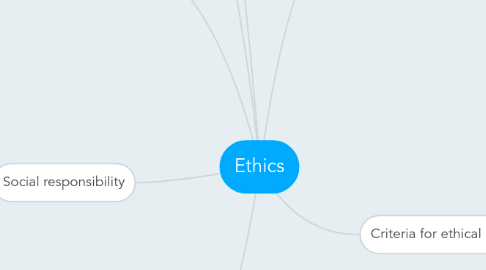
1. Moral development
1.1. three stages
1.1.1. Preconventional
1.1.1.1. Follows rules
1.1.1.2. domain of human action
1.1.1.2.1. legal standards
1.1.2. Conventional
1.1.2.1. Social system DHA
1.1.2.1.1. Many managers are here
1.1.3. Postconventional
1.1.3.1. Personal standards DHA
1.1.3.2. Principaled level
2. Social responsibility
2.1. Stakeholders
2.1.1. Government
2.1.2. Community
2.2. Criteria of Corporate Social Performance
2.2.1. economic responsibility
2.2.1.1. profit maximizing view
2.2.1.2. Milton Friedman
2.2.2. legal responsibility
2.2.2.1. Society deems worthy
2.2.3. Ethical responsibility
2.2.3.1. equity, fairness, impartiality
2.2.4. Discretionary Responsibility
2.2.4.1. Social contributions not mandated by law
3. Code of ethics
3.1. Principal Based
3.1.1. Corporate culture
3.1.2. credos
3.2. Policy based statments
3.2.1. Code of ethics
3.2.1.1. Top level management must support
3.2.2. Deals with ethical situations
4. Structure
4.1. Ethics committee
4.2. Cheif accounting officer
4.3. Cheif ethics officer
4.4. Ethics training
5. Whistle blowers
5.1. good for a company
5.2. Companies must protect them
5.3. Manegers see them as disgruntled
6. Domain of human actions
6.1. Legal standard
6.2. Social Standard
6.3. Personal Standard
7. Criteria for ethical Decision making
7.1. Utilitarian approach
7.1.1. Jeremy Bentham
7.1.2. John Stuart Mill
7.1.3. greatest good for greatest Number
7.2. Individualism approach
7.2.1. Promoting self interest
7.2.2. Not lying cheating to gain
7.3. Moral right approach
7.3.1. People have rights
7.3.2. Cannot violate
7.4. Justice approach
7.4.1. equality, fairness, impartiality
7.4.2. Distributive justice
7.4.2.1. men and women same pay
7.4.3. Procedural justice
7.4.3.1. Fair Rules
7.4.4. Compensatory Justice
7.4.4.1. compensation for injury
7.5. Virtue ethics approach
7.5.1. Moral behavior from personal virtues
7.5.2. Plato and Aristotle
7.6. Practical approach
7.6.1. uses social standard or society
